Dear founders, investors, LPs,
Our corner of the world was once small, united by one pursuit: life’s work. Specifically, life’s work applied to innovations that serve human progress. The opposite is now true. Perception addiction reigns.
Pursuing life’s work is out of fashion. A party faux pas. Replaced by a lust for Twitter fame, built-to-flip fortune, and an invitation to tonight's hottest party.
Look no further than the annual meme contest for the MVP of July 4th:
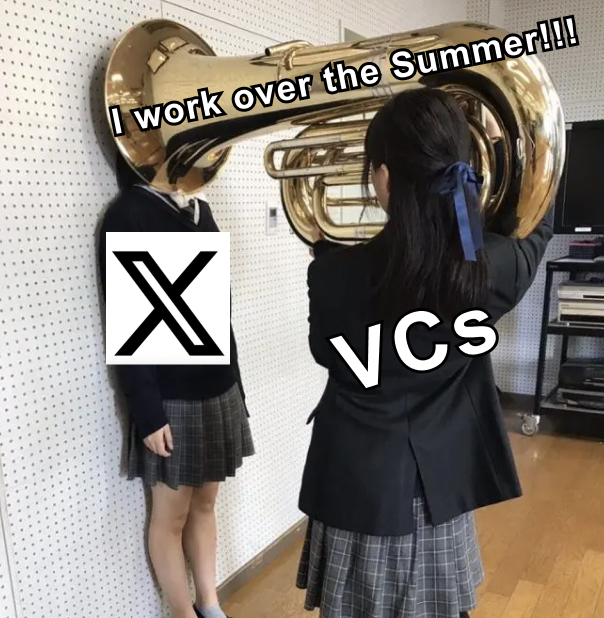
Silicon Valley has a problem. A “small problem”, problem.
Forty years ago, a Bell Labs scientist observed, “when you are famous it is hard to work on small problems.“
That scientist was Dr. Richard Hamming (h/t Spenser Skates), a Turing Award winner and an Oppenheimer Manhattan Project team member. This was an early instance of what’s happening across the entire ecosystem of innovation today: Silicon Valley is famous.
It is costly – perhaps dangerous – when high achievers are distracted from pursuing their life’s work.
Yet, as Hamming says “great contributions are rarely done by adding another decimal place. It comes down to an emotional commitment.”
It’s about discovering and doing life’s work.
It’s about great startups starting with small problems.
It’s about Davids beating Goliaths.
What is life’s work? And how does it solve our “small problem” problem? Fittingly, there is an author whose life’s work is about life’s work. James Carse is best remembered for one book, Finite and Infinite Games. A book about life’s work.
Life’s work is a long-term commitment to a worthwhile personal mission. Its daily practice produces greatness.
So what’s it like to be engaged in your life’s work? I present 5 parables (all images from Carse’s book) -
I: Turn surprises into serendipity
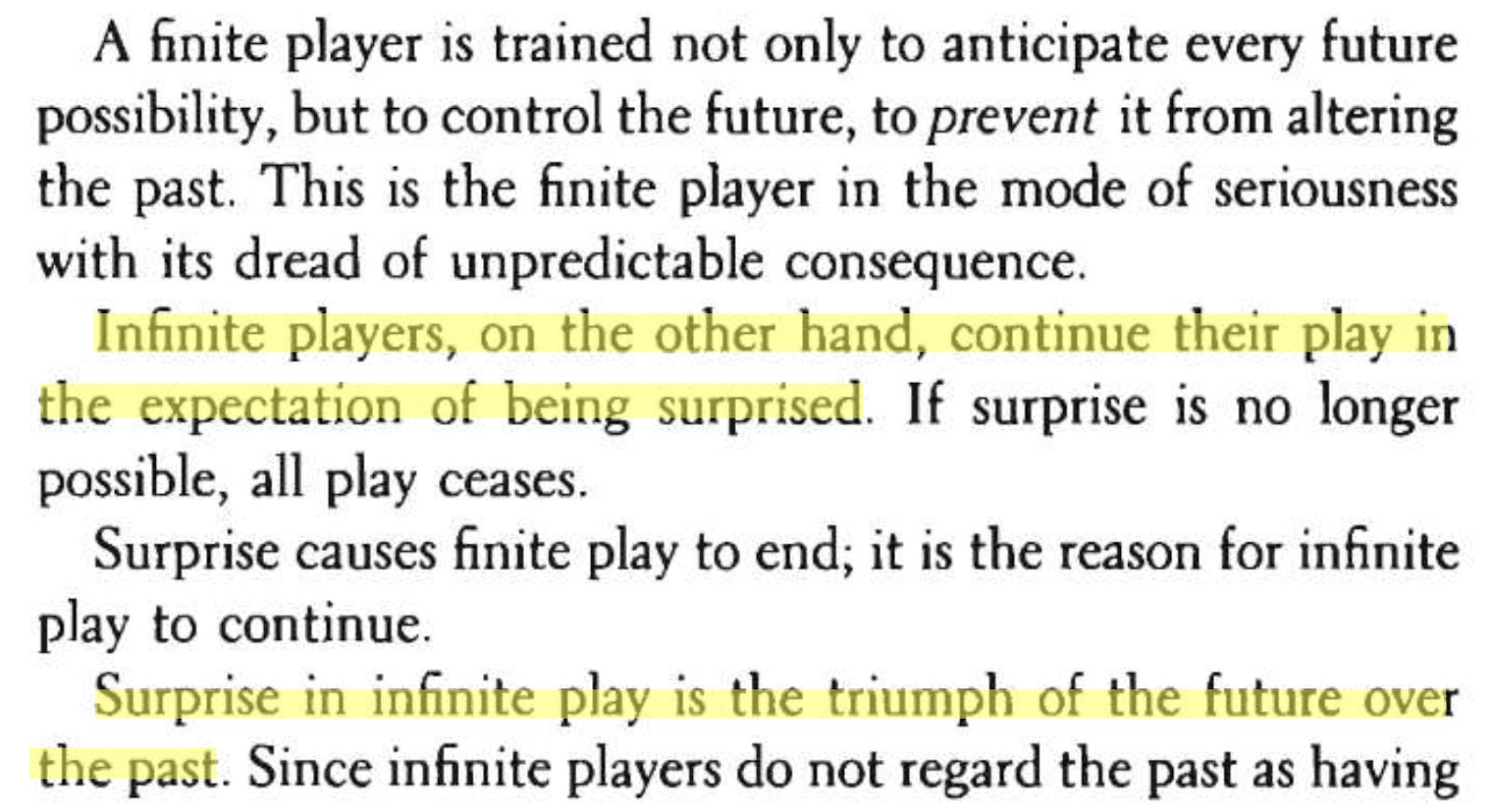
One of my favorite quotes about the startup building journey is from Peter Thiel:
“Tolstoy opens Anna Karenina by observing: “All happy families are alike; each unhappy family is unhappy in its own way.” Business is the opposite. All happy companies are different: each one earns a monopoly by solving a unique problem. All failed companies are the same: they failed to escape competition.”
Founders must persevere through unscripted journeys to solve unique problems. Sometimes this journey is called acting with first principles, or navigating an idea maze (h/t Balaji, Chris Dixon).
Diane Greene is a champion sailor, conquering a sea of surprises for fun and for work. She never raised venture funding for VMware. This was not for venture capitalists’ lack of interest. The dotcom bubble – a surprise – had just popped. Nervous VCs lowered valuations significantly. Expecting the unexpected, Diane had backups. VMWare took funding from strategic investors instead. Last fall, VMware was acquired for $69B.
Expect all the unexpected, and the expected. Diane created opportunities out of surprises.
II: Be lead by intrinsic motivation
“The infinite game - there is only one - includes any authentic interaction, from touching to culture, that changes rules, plays with boundaries and exists solely for the purpose of continuing the game…Finite games are theatrical, necessitating an audience; infinite ones are dramatic, involving participants..."
“In as much as finite play always has its audience, it is the audience to whom the finite player intends to be known as winner. The finite player, in other words, must not only have an audience but must have an audience to convince.”
Jessica Livingston, Co-Founder of YC, recently started a podcast. She intends it to be “not too scripted, very conversational and authentic” to share more about founders “as people” without “talking from a script”.
Jessica is an infinite player, doing her life’s work of serving founders and the broader startup ecosystem. Her pursuit is one of learning from and understanding the entrepreneur, not accumulating audience.
“I just want to have conversations that I personally find interesting. I'm very selfish about it. As long as I have an interesting conversation, I tell [note: her co-host] Carolyn this all the time, as long as we have 20 listeners, that's all I need. 20 really interested listeners, we'll keep doing it.” (h/t Lenny Rachitsky’s podcast)
“We’ll do a few episodes…We’ll keep going if it’s fun.” Fun is a great barometer for intrinsic motivation.
III: March forward with nerves of steel
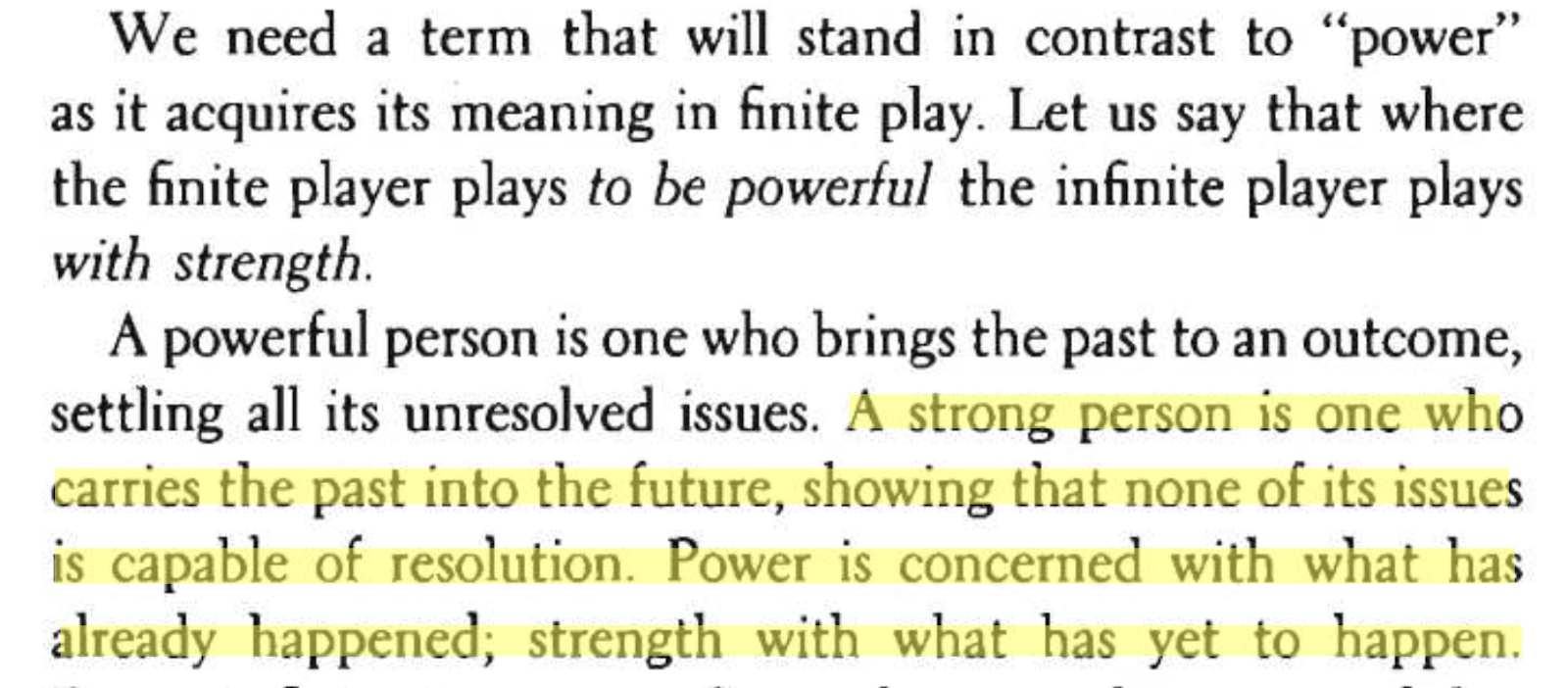
As you go about your life’s work, you will confront moments of despair where the only way forward is reinvention. Two extreme examples…
Whitney Wolfe Herd started Bumble after she was famously fired from Tinder. Parker Conrad started Rippling after moving on from unresolved threads at Zenefits.
Whitney described being “ostracized”, receiving “a scarlet letter”, hearing that “friends from college didn’t want to talk to me anymore”, and “waking up to headlines about myself, being described in all sorts of ways…”.
“I just did not understand what the point was anymore, it was right in that moment…same piece of the same storm, of feeling such a deep pain and such a deep problem…it’s my duty on earth to fix this”.
Bumble launched within 6 months of her Tinder departure. It is now a public company.
Parker said on a podcast: “I sort of spent 6-9 months hiding at home, not really talking to many folks.” “When we announced our Series A, people got attacked for investing. Supporting me was a deep moral failure.”
“I really wanted this product to exist, I felt like Zenefits had suddenly collapsed for all these crazy reasons that had nothing to do with the fundamental approach.”
“Nobody’s going to build this if we don’t, and there's $100B dollars lying on the floor. On the street. You and I are the only people that can see it. Everyone is walking by oblivious! We know if we build this, it’s going to work. That’s what people want.”
Rippling is now valued at $13.5B and at their scale, one of the fastest growing companies in the world (data from: Mamoon Hamid).
IV: Purposeful work leads to luck
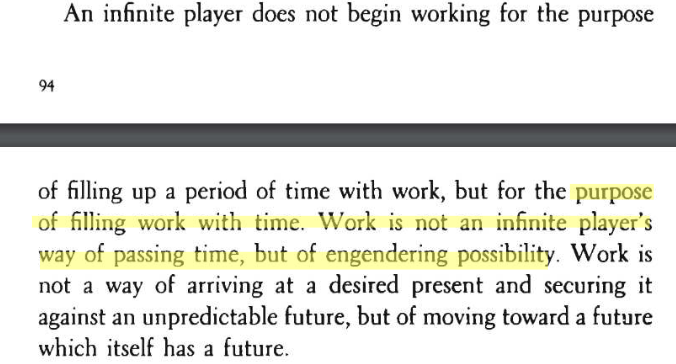
Ann Miura-Ko’s life’s work is opening doors for the next generation interested in technology and startups. I would not be where I am without her.
People engaged in their life’s work don’t work backwards from a number, or from a fixed goal. Instead, they work in a direction – like heat-seeking missiles – doing purposeful work.
Along the way, they get lucky surprises that appear like “breaks”. For Ann, while working as a photocopier for the Yale Dean of Engineering she built a reputation that when Lew Platt, then CEO of HP came for a campus tour the Dean selected Ann to lead his tour.
Lew then invited Ann to experience a day as HP’s CEO, treating her as an equal in a meeting with Bill Gates. This became a pivotal moment in Ann’s career. How did this happen? Ann chose to do purposeful work, leading luck to choose Ann.
V: Time in tension & intention
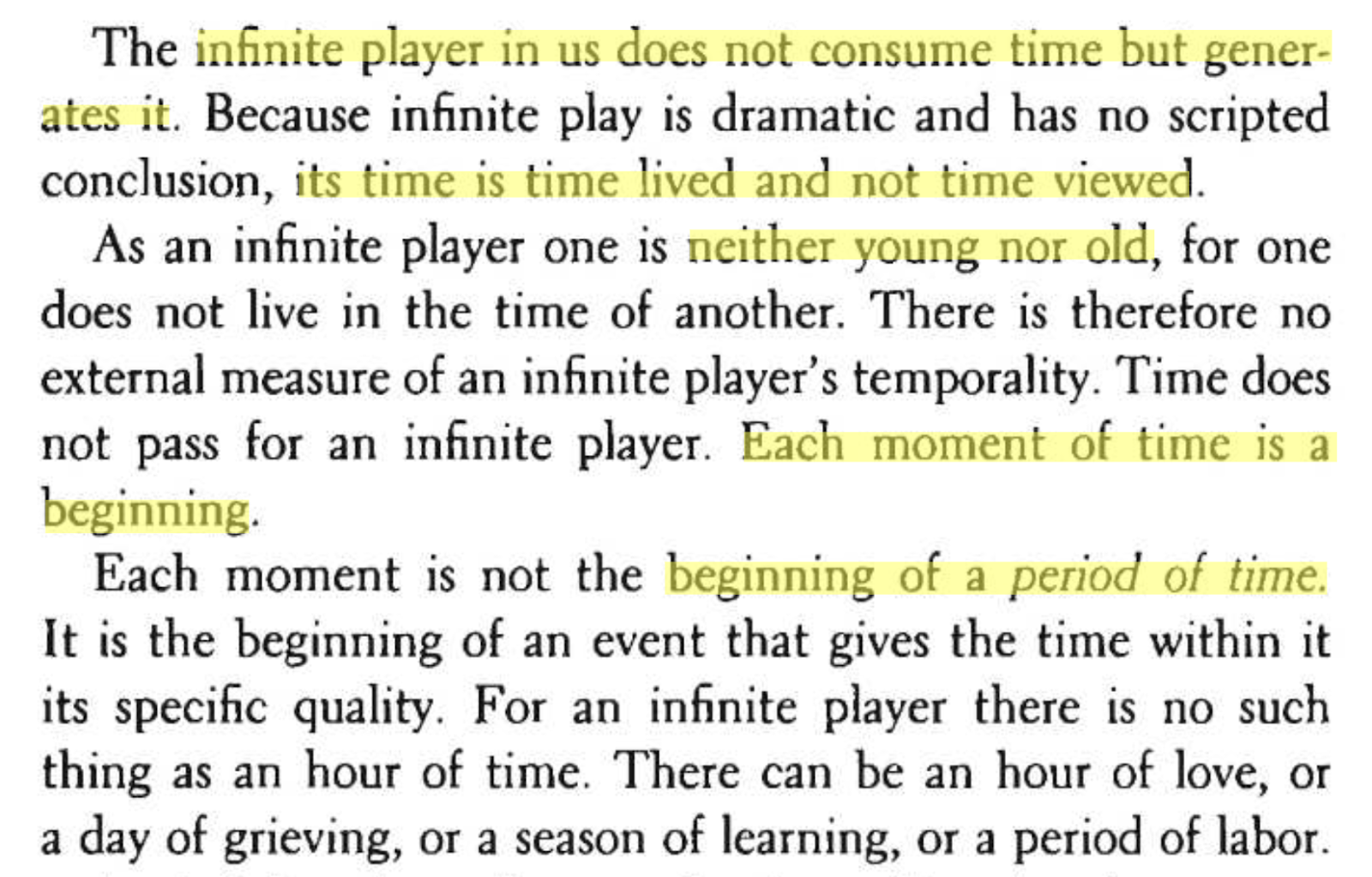
Jeff Bezos is legendary for playing the long game, daily.
In the 1997 shareholder letter: “Day 1 is about being constantly curious, nimble, and experimental.”
In the 2016 shareholder letter: “Day 2 is stasis. Followed by irrelevance. Followed by excruciating, painful decline. Followed by death. And that is why it is always Day 1…Staying in Day 1 requires you to experiment patiently, accept failures, plant seeds, protect saplings, and double down when you see customer delight.”
Sam Hinkie, the former GM of the Philadelphia 76ers and now an investor, operates from a long time horizon across every moment and decision.
Reflecting on his marriage, basketball career, and investing journey, Sam writes “to take the long view has an unintuitive advantage built in—fewer competitors”.
While at the 76ers, in a meeting, Sam’s colleague wanted to do things right, not cut corners, and have a decision stand the test of time for the next 3-4 years. Sam interrupted, ‘I think you mean, 30 or 40 years.”
Units of time are best kept in tension: intentionally thinking in decades while executing in moments.
“Go your own way”
Life’s work is your way. In the arena.
During my senior year at Princeton University, I was fortunate enough to take “High-Tech Entrepreneurship'' – one of the most coveted courses. Its beloved professor, Ed Zschau, enforces one rule: in this class, you cannot miss class. Otherwise, your final grade will be penalized… severely.
It was the height of job hunting season when I landed a final interview at my top-choice. The catch? I was double-booked. I rushed to Prof. Zschau’s office and pleaded for an exception. Prof. Zschau said he could not answer, and to make my own decision.
I got the job, and got an A.
His rule was a misdirection, meant to reveal the direction for beginning your life’s work: break his rules, and make your own.
As an homage to Prof. Zschau’s signature parting gift – singing his version of the Frank Sinatra record, “My Way”, but titling it, “Your Way” – I leave you with this. Your life’s work is your way. Make sure it’s really you.
Thank you to Ed for an important lesson early in life: thinking and acting for oneself with courage and conviction.
Thank you to Andreessen Horowitz and the entire team. I am forever grateful for an education-of-a-lifetime in business, technology and entrepreneurship these last four years. It’s been a blast. To all the incredible people I've had an opportunity to work with (regrettably, too many to individually name!), thank you. I cannot wait to keep playing this game together, ∞.
Thank you to Alfred Lin for always encouraging me to believe in myself.
Most importantly, to founders I’ve worked with and met. You are my heroes. Thank you for the privilege to be your partner.
p.s.,
And while I believe this is old news for most of you on X, for those who don’t know ~ I’ve left a16z. I’m off to do my life’s work 😉🌊.


